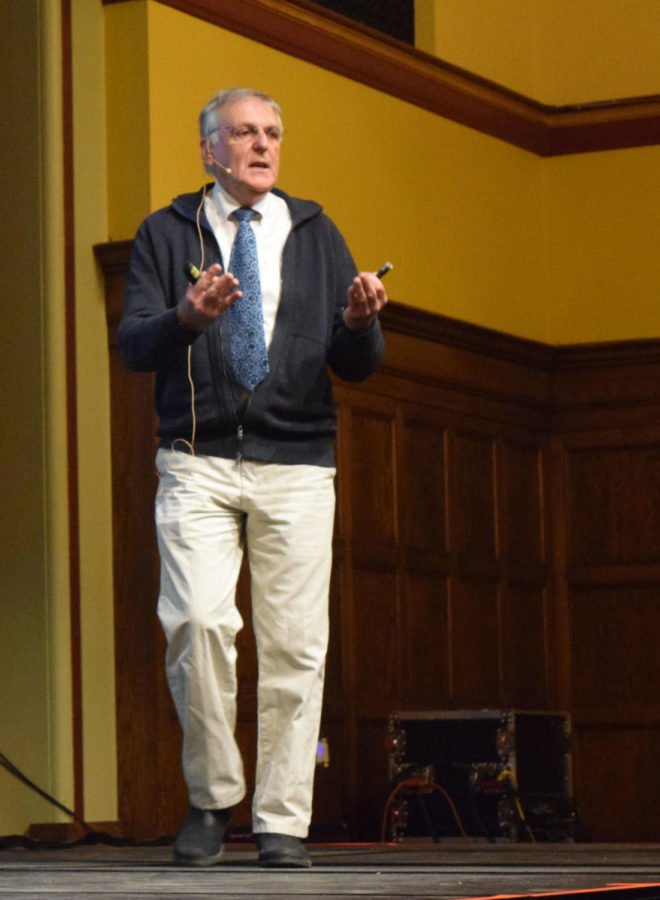Nobel laureate discusses how to be a technological entreprenuer
Abigail Schafer/Iowa State Daily
Dan Shechtman, an Iowa State distinguished professor of materials science and engineering and research scientist at Ames Laboratory, speaks on technological entrepreneurship Feb. 6 in the Great Hall.
February 6, 2017
Hearing a Nobel laureate speak is not an opportunity that presents itself often at Iowa State. When distinguished professor Dan Shechtman spoke at the Memorial Union Monday, a mass of students showed up to listen.
Shechtman received the 2011 Nobel Prize in chemistry, but his lecture focused on a different topic: technological entrepreneurship, a topic that he believes is “key to world peace and prosperity.”
Technological entrepreneurship is an area that Shechtman has been involved in for nearly 30 years. In 1987, he began a course on technological entrepreneurship at Technion – Israel Institute of Technology, a course still being taught today.
“Technological entrepreneurship is the establishment of a new technological venture,” Shechtman said.
Monday’s lecture focused on how technological entrepreneurship can aid the world today and improve upon the current state in certain areas. Shechtman highlighted certain countries in the world, including the United States, where an increase in technological entrepreneurship would benefit the citizens.
“We have to develop entrepreneurial spirit and knowledge. It doesn’t come naturally to everyone,” Shechtman said.
He believes this begins with early science education. Starting to push science and technology to kids at a young age will develop technological entrepreneurship.
In Israel, his country of birth, Shechtman has worked to start a program for kindergarten students. The program has scientists work with teachers to teach instructors about basic science that they can then pass on to their students. So far, the program hasn’t been successful, but Shechtman hopes to fix some issues and see it improve.
Shechtman has witnessed technological entrepreneurship mostly in high-tech start-up businesses. His course at Technion mostly includes guest speakers who have done just that — start their own technology company.
“What do I know about technological entrepreneurship? I want to listen,” Shechtman said.
That’s exactly what he did. He would bring top tech business leaders to Israel to talk to his class each period. Shechtman shared some of the tips for starting a tech business during his lecture.
He advised that when starting a business, use as little money as possible and offer others a share of the business in exchange for needed resources.
“Failure is OK,” Shechtman said.
The professor stressed that failure is perfectly fine. It often can deter others from continuing.
Innovation also was an important aspect emphasized for beginning a tech business. Shechtman said that while some succeed by obeying, success in innovation comes from free thinking.
Starting a tech business is not the end goal, and Shechtman explained how to further build a company.
“Growth is dependent on the ability of an engineer to call the CEO and say, ‘I have a great idea,'” Shechtman said.
He explained how that ability, from the perspective of an employee, can lead to exponential growth and subsidiary ventures. If everyone has the power to go directly to the boss with new ideas, innovation is ripe and rampant.
“[Shechtman] provided encouragement to start-up, and showed it’s not scary to do that,” said Steve Martin, distinguished professor of materials science and engineering.
Martin plans to start his own company in the next year and hopes to use Shechtman’s advice.
Shechtman will continue research in the field of chemistry. He also has a science-based TV show that targets children in the hopes of fostering early science education.
“Its not often you get to hear advice from a Nobel laureate,” Josh Westphalen, sophomore in history, said.







